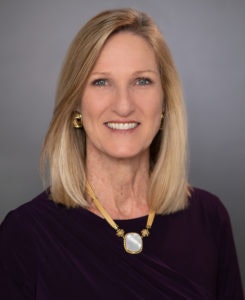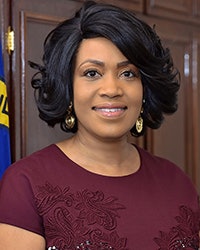 Cecilia Holden, president and CEO of myFutureNC.
Cecilia Holden, president and CEO of myFutureNC.
“As a 17-year-old, I thought I had it all figured out. But you never know what you don’t know, until you go through something that flips your whole world upside down,” said Allen. “After his passing, I couldn’t cope properly. As a result, I chose to drop out of school.”
But by 2016, Allen decided to return to school and complete her education. After earning her high school diploma, she received a Longleaf Commitment scholarship, a last dollar scholarship created by North Carolina Governor Roy Cooper through federal pandemic relief funding. With those funds, she was able to enroll at Blue Ridge Community College as a human services technology student, on track to graduate this May.
“For a lot of people, having a scholarship can be a make or break. Community college may be more affordable, but it can be out of reach for some people,” said Allen. “Adult learners, a lot of us are living paycheck to paycheck. I was happy to receive a scholarship, to be able to pursue my dreams and attain my goals.”
Allen will be the first person in her family to cross the graduation stage, and educators, leaders, and policy makers in North Carolina are working hard to see more adult learners like her and high school graduates follow in her footsteps. MyFutureNC, a statewide, nonprofit organization led through cross-sectional collaboration, set a goal to see two million North Carolinians aged 25 to 44 attain an industry-valued credential or postsecondary degree by the year 2030. Two years after the goal was first set, myFutureNC board members, state senators and representatives, educational leaders and Gov. Cooper gathered together to share the state’s progress.
“We’re currently 31,000 skilled workers behind where we needed to be to meet this [goal,]” said Cecilia Holden, president and CEO of myFutureNC. “We are facing a state of emergency around our talent pipeline.”
Holden introduced two legislative proposals to get the state back on track: introducing intentional career planning for every middle and high school student in North Carolina, and the creation of Reinforcement and Investment to Strengthen the Economy (RAISE) Scholarships, which would create more no-cost pathways into skilled credentials and degrees.
 North Carolina Secretary of Commerce Machelle Sanders.
North Carolina Secretary of Commerce Machelle Sanders.
North Carolina Secretary of Commerce Machelle Sanders encouraged leaders to look at the whole student when considering what could be holding them back from success, particularly when it comes to students from low-income backgrounds.
“it is difficult for a student or child to go to school and be successful—possibly impossible—if [they are] hungry,” said Sanders. “It’s important for us to address the whole person, the whole student, make sure that people feel safe and address poverty situations, mental health situations, or lack of healthcare.”
Gov. Cooper echoed Sanders, calling for deeper investments in early childhood education and taking steps to support students through their entire educational journey, “from cradle to career.”
“We’ve got to keep working on this. We all agree it’s critical. We all believe that education is the great equalizer, it does provide opportunity for everyone, and it helps with my mission for our state: to have a North Carolina where people are better educated, healthier, have more money in their pockets, and opportunities to live lives of purpose and abundance,” said Cooper. “We have to be ready to make investments in education.”
Eric Davis, chair of the North Carolina State Board of Education, called for an openness to new ideas and a willingness to change, as well as increasing support for teachers in K-12 classrooms and beyond.
“We must transform our educational systems to serve all our students, giving each student access to highly effective educators,” said Davis. “Students need exposure to career opportunities that spark their interests and enable them to see their potential. We must demonstrate how much we believe in them before they believe in themselves.”
Holden added that this effort will take collaboration from all sectors, not just education and policy. She asked those in attendance to find just one person and encourage them to go back to school or dream about a bigger, brighter future for themselves.
“Be the encourager they need so that, one by one, we see these sparks light a fire all across the great state of North Carolina,” said Holden. “How do we get to two million? One student at a time.”
Liann Herder can be reached at [email protected].






















